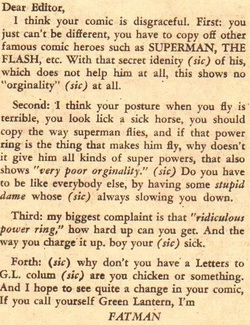 Originally posted at Pencil Panel Page. Serial comic books seldom end with a letters column these days, but I’ve begun to appreciate the notes from readers more and more in my research. I never imagined that I would be planning a trip to the Library of Congress to read 1950s comics that are readily available in reprints, merely so that I can browse the original fan letters as well as the ads and other promotional material in circulation at the time. So my question this week is pretty simple: what is the value of the letters column to you? Of course, letter pages from the 1950s, 60s, and 70s were hardly straight-forward monologues of fan response. The columns are well known for staging conversations between readers and comic book creators in ways that I have always found fascinating. The replies from the editors are often carefully crafted teasers for upcoming issues or tongue-in-cheek rebuttals to criticism; witness the way in which the Green Lantern editor responds to the above letter by ridiculing the reader’s spelling errors! Even the most selective, highly-mediated exchanges can offer some insight into the brambles of reader response and the creative process. The abundance of today’s online message boards and review blogs (and perhaps even comics scholarship?) may have replaced the traditional letters columns, but while mainstream comics creators admit to reading online feedback, they seldom participate in the same way. It’s especially unfortunate that trade paperback reprints jettison the letters pages altogether.
Independent comics in print and on the web are developing new ways to recapture the energy of the letters column. For example, in an essay from Comics and the U.S. South, Andy Hoefer remarked upon the interactions that surrounded the web version of Josh Neufeld’s AD: New Orleans After the Deluge in SMITH Magazine: In the context of work of documentary art, the comments played out in a surprising way: the readers could not only offer their reactions, but in fact, engage with the author and even the subjects of the text. And given the serial form in which A.D. first appeared, readers could even offer editorial decisions. (315) In a different context, Brian K. Vaughan ended the second issue of his new series Saga (Image) by initiating a conversation under the guise of a reader’s survey that he hoped would generate responses for the comic’s letters column. Below are the last five questions: 21) Who had a greater impact on your upbringing, your favorite librarian or your favorite coach? 22) What are you working on these days, anything creative? 23) Wait, why did you abandon it? 24) Relax, I’m sure it’s great. Listen, why not put down this comic and do a little work on your thing RIGHT NOW? 25) Cool, but before you do, if you were to be reincarnated as an inanimate object, what would it be? Interestingly, Vaughan encourages readers to tear out the survey page and mail their responses to a street address, not through email or Facebook – despite the fact that consumers like me read the series on an iPad. (Anyone else out there keeping up with Saga by the way?) So how do you read comic book letters columns? What do these letters reveal and conceal? Do you use them in your research? And have you ever written one yourself? Comments are closed.
|
AboutAn archive of my online writing on comics, literature, and culture. (Illustration above by Seth!) Categories
All
Archives
July 2020
|

 RSS Feed
RSS Feed